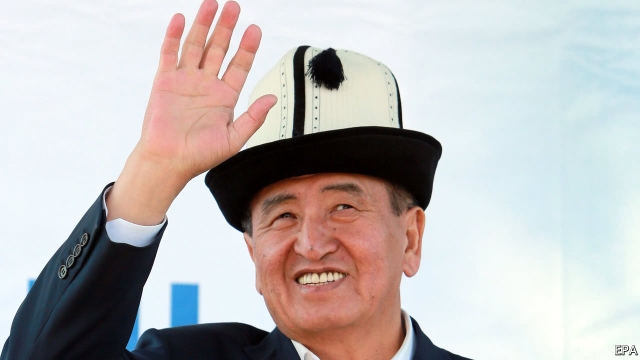 Nor was it a triumph of democracy
Nor was it a triumph of democracy
AS THE young man hesitated, golden autumn leaves drifted down onto the streets of Bishkek, the relaxed capital of Kyrgyzstan. “It’s a choice between old and new. I can’t decide,” he explained, as he hovered outside the polling station. The choice was as unusual as it was difficult. Kyrgyzstan—a mountainous post-Soviet country of 6m people bordering China—was holding the first genuinely competitive presidential election in Central Asia, a region ruled by strongmen who typically romp home with close to 100% of the vote.
In the end a majority of Kyrgyzstan’s voters plumped for old over new, or at least continuity over change, electing Sooronbay Jeyenbekov (pictured), a former prime minister anointed by outgoing president Almazbek Atambayev. Mr Jeyenbekov, a dour 58-year-old with all the panache of a Soviet apparatchik, beat his more dynamic rival, Omurbek Babanov, a 47-year-old businessman (and also a former prime minister) with 55% of the vote. That may seem like a comfortable victory by Western standards, but it is a far cry from the 89% Uzbekistan’s president racked up last year, or the 98% polled by the rulers of Kazakhstan and Turkmenistan in their most recent re-elections.
Mr Babanov, who came second in a field of 11 candidates with 34%, conceded defeat gracefully, defusing fears that the election could spark political turmoil in a country where two presidents have been overthrown in the past 12 years. As Mr Babanov said: “The people have spoken.” Yet in the same breath he complained of electoral misconduct that he believes robbed him, if not of victory then of a fair fight. Kyrgyzstan has a biometric voting system that precludes the blatant election-rigging that prevails elsewhere in Central Asia, but international observers listed flaws ranging from vote-buying to media bias and the harnessing of the state to back Mr Jeyenbekov. A deputy prime minister, for example, was caught on film instructing a group of civil servants to vote for him.
Mr Babanov’s rivals also deployed ugly dog-whistle politics, smearing him as an unsuitable president because he is half-Turkish and has a Kazakh wife. They also misleadingly edited footage of one of his rallies to portray him as trying to rile members of the Uzbek minority in southern Kyrgyzstan—incendiary tactics in a country where clashes in 2010 between Kyrgyz people and Uzbeks led to hundreds of deaths.
Mr Atambayev likes to portray himself as a devoted democrat—but to get his handpicked successor elected, he resorted to tricks straight out of the authoritarian playbook. Opposition leader Omurbek Tekebayev was jailed ahead of the vote on suspiciously conveniently timed corruption charges. During the campaign some of Mr Babanov’s supporters were arrested, improbably enough, for plotting the violent overthrow of the state.
The defeated candidate fears he may be next to land in prison, after Mr Jeyenbekov promised during a heated television debate to start fighting corruption—a constant blight in Kyrgyzstan—by imprisoning Mr Babanov. Mr Atambayev, for his part, pledged on election day to keep jailing anyone who “pulls stunts”. These tensions may get worse. The ruling party, led by Mr Jeyenbekov, will have to work with the opposition in parliament, including Mr Babanov’s faction, the second largest in the legislature.
By stepping down, Mr Atambayev has broken the mould by giving up power after one term, as the constitution dictates, in a region whose longest serving president—Kazakhstan’s Nursultan Nazarbayev—has ruled for over a quarter of a century. But the government’s blatant bias during the campaign was at odds with this apparent diffidence. That has prompted speculation that Mr Atambayev seeks to remain the power behind the throne.
By staging the region’s first ever competitive election, Kyrgyzstan has marked itself out as a democracy of sorts. But the true test lies ahead: will the outgoing and incoming presidents allow democracy to flourish, or nip it in the bud?
The Economist, 18.10.2017




